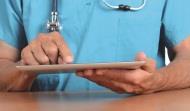Mobile working holds many benefits for the NHS, but success depends on finding the right solution, says Dr Shaun O’Hanlon

Paper clips
Mobile working is a key part of delivering the paperless NHS − and the rise of tablet devices and smartphones means it is also something we now expect in our everyday lives.
While the benefits appear self evident, achieving secure mobile working for clinicians is a major technical challenge and − contrary to our experiences as consumers − usually requires something far more robust than downloading an off-the-shelf app.
So how can clinical commissioning groups liberate clinicians and at the same time protect confidential patient data in the field?

Why go mobile?
As with any major project, the starting point for an investment in mobile working must be to consider the benefits you want to achieve.
A recent report from the Department of Health’s national mobile health worker project confirmed the many positives it can bring. These include: improved productivity (more patient contact time), a reduction in unnecessary travel and improved efficiencies by removing duplicate data entry.
There is also exciting potential for virtual consultations that will bring expert knowledge to the patient’s bedside. The technology is already here to enable a GP doing a home visit to conduct a three-way consultation with a specialist via a video conferencing link, to discuss a complex issue.
‘The overriding challenge for mobile working in the NHS is security and the protection of confidential patient information’
As well as clinical benefits, there are management benefits. Community teams can plan their visits more efficiently and effectively to maximise their time with their patients. The ability to send new appointments or messages directly to clinicians in the field − and for them to be able to access the patients’ clinical records − will improve productivity, efficiency and patient care.
Clinical data captured at the point of care will be uploaded to the electronic patient record, where it can be used for management reporting and can contribute directly to various NHS datasets, including: the quality outcomes framework and the community information, sexual health dataset and mental health datasets.
Mobile working is not just limited to mobile health workers in the field. It also has a huge relevance in acute care − for example, enabling consultants on ward rounds to view and add to patients’ records and to prescribe on the spot. It is likely that most patient care in hospitals will be conducted in this way in the future.
What are the challenges?
Good mobile and internet reception is not as ubiquitous as we might think, which makes connectivity a major challenge − particularly in rural areas. Fortunately, most mobile community management systems can cope with this, by storing the data on the device until the user moves to a different area, where connectivity is restored and the information is integrated into the patients’ records.
‘Not all mobile solutions work in a seamless manner and CCGs should be wary of the pitfalls of a less joined-up approach’
But the overriding challenge for mobile working in the NHS is security and the protection of confidential patient information. Until you get directly involved in a mobile working project, you may not realise just how many considerations are needed to achieve a “bulletproof” solution.
There are at least four stages to consider before you look at the security of the mobile application itself. These include:
- Who is allowed to work on a mobile device? The weakest factor in any security system is people.
- Choice of device. Choose one that supports device encryption and can be secured and protected with a strong password.
- Consider whether you want to invest in a mobile device management system. This will allow you to control what happens to a device if it is lost or stolen − for example, remotely wiping all data from the device.
- Before you roll out mobile working, make it clear where devices are to be kept and how they can be used.
Only now can you think about the mobile application itself. All data held on the app should be strongly encrypted using 256-bit encryption and access to it should be protected by a two-factor authentication process. For instance, a number-generating token carried by the user and a secure password.
The gold standard
Mobile working means different things to different people but there is a gold standard that CCGs should aim for. This is to find a solution that will deliver seamless synchronicity between the clinician’s main system and work done via a mobile device, providing the necessary information at the point of care and updating new data from the consultation back at base.
‘There are plans to use mobile devices to replace paper-based forms on hospital wards’
This approach recognises that mobile working is simply another interface with the clinician’s main system, not just a bolt-on.
Not all mobile solutions work in this seamless manner and CCGs should be wary of the pitfalls of a less joined-up approach, which can risk the degradation of data. It can also make working more time-consuming, not less.
For one trust participating in the national mobile health worker project, the “lack of an electronic clinical record” to enter data into resulted in an increase in data duplication when mobile working was introduced.
Merseyside goes mobile
Healthcare trusts and CCGs in Merseyside are ahead of the curve, thanks to work by Informatics Merseyside to partner with NHS IT suppliers to develop a range of mobile working solutions.
Around 300 community staff − including district nurses and community matrons − are already using mobile applications to deliver clinical data at the point of care. These range from locally developed apps to solutions that are fully integrated with an existing clinical system. Devices, including tablets and smartphones, are selected according to users’ needs.
The number of users is expected to grow exponentially in the coming months as mobile working expands across Liverpool Community Health Trust. There are also plans to use mobile devices to replace paper-based forms on the wards at Aintree University Hospitals Foundation Trust − integrating patient information directly into the trust’s electronic patient record system.
Mark Bostock, director at Informatics Merseyside, said: “Our focus has been twofold: to deliver patient data at the point of care for community clinicians and to enable agile working; freeing up people’s working day and making it more efficient.
“We’ve had very positive feedback from clinicians and we’re excited about the future benefits as we roll out to new services.”
Dr Shaun O’Hanlon is clinical and development director for EMIS


























2 Readers' comments